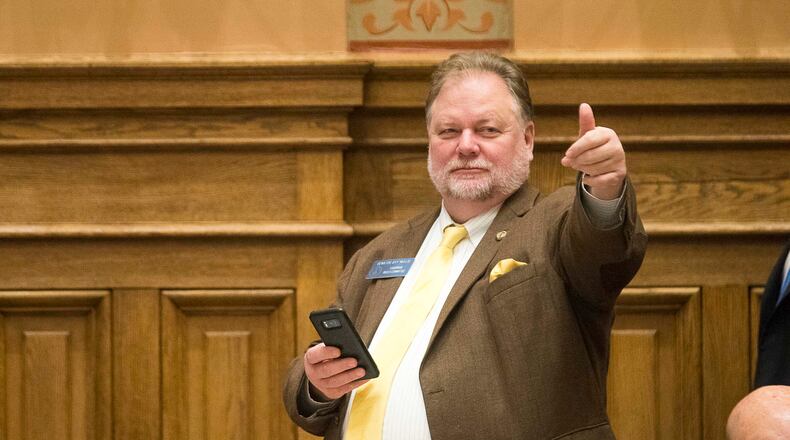Big-money political donors may get another way to give unlimited campaign contributions to their favorite state politicians, and to do so while lawmakers are considering bills they’re interested in.
The Republican-led Georgia Senate voted 30-21 Friday along party lines for Senate Bill 221 — sponsored by Senate Rules Chairman Jeff Mullis, R-Chickamauga, and backed by state GOP leaders — that would allow the creation of something called state “leadership committees,” which are common in Washington.
Senate Democrats opposed the measure.
The bill would let a governor, lieutenant governor, a party’s nominee for those positions, and House and Senate Republican and Democratic leaders create such committees, which would raise money either for their own races or to try to affect other contests.
Statewide candidates are allowed to raise about $18,000 per election cycle if they make a runoff — $7,100 in legislative races — from individual donors. But limits on how much donors could give to the committees would not apply. So contributors — typically lobbyists, industry associations or businesses interested in legislation or state funding — could give as much as they like.
Mullis said the bill was designed to fight so-called dark money — funds that hide the identity of donors, something that has become more common in the past decade.
The Republican lieutenant governor’s race in 2018 was greatly affected by last-minute attack ads against former Senate Republican leader David Shafer that were funded with dark money. In the party’s runoff that year, Geoff Duncan beat Shafer and then went on to win the general election.
“The outside influence of dark money has always bothered us,” Mullis said. “This bill will shine the light on a cancer on our democracy.”
He said it will do that by forcing the leadership committees to disclose their donors and expenditures, like political action committees currently must do.
But ethics experts told The Atlanta Journal-Constitution that the bill will not eliminate the so-called “independent committees” that collect dark money contributions to influence campaigns.
Sen. Jen Jordan, D-Atlanta, said the bill would do nothing for either transparency or the push to limit dark money. She noted that special-interest donors could still give to political nonprofits, who then would donate to leadership committees in the name of the nonprofits without saying where the money originated.
Such washing of campaign donations is fairly common when it comes to “independent committees” that spend to support or oppose candidates.
Jordan also said such leadership committees could raise money during legislative sessions, so lobbyists and business interests could, say, give $100,000 to a leadership committee just as House and Senate leaders are considering bills they hope to see passed. In-session contributions to lawmakers were outlawed decades ago.
“It should be called the Rules Don’t Apply to Us Act, the Incumbency Protection Act, the We Should Be Ashamed Act,” she said. “This is what makes people not trust the system and not trust us.”
Leaders such as Duncan and House Speaker David Ralston already have ways to raise unlimited funds from deep-pocket donors.
Duncan, for instance, has an independent committee called Advance Georgia, which has raised $1.6 million since mid-2019 to help Republican Senate candidates.
That included $150,000 from two Washington-based Republican groups, $80,000 from the Georgia trial lawyers lobby, $70,000 from two nursing home political action committees, $50,000 from Georgia Power, $50,000 from the sports betting and horse racing lobbies, $40,000 from the road-builders lobby, $20,000 from the car dealers lobby, and $35,000 from the company that has a contract to manage the state’s PeachCare for Kids health insurance program.
The House and Senate Republican caucuses have long had mega-PACs where they, like Duncan, raised almost all their money from people interested in policy and state funding to help stave off Democrats attempting to retake control of the chambers they lost in the 2000s. Those funds played a major role in helping the GOP limit losses in the 2020 elections.
The House Republican Trust, for instance, has raised more than $5 million since the 2018 elections, with a big push coming after Ralston promised a major push following Democratic pickups that year in his chamber.
Many of the same people wrote big checks, including $145,000 from the trial lawyers, $121,000 from Georgia Power, $100,000 from the small-loan, high-interest-rate industry’s lobbyists, $90,000 from the Pruitt family nursing homes, $55,000 from AT&T, $25,000 from the highway contractors lobby, and an additional $450,000 from the Republican State Leadership PAC, a Washington-based group that worked to oust state House Minority Leader Bob Trammell.
An AJC review of campaign disclosures shows the House trust collected more than $180,000 during the 2020 General Assembly session, including money from e-cigarette companies (lawmakers were considering e-cigarette tax legislation) and cable companies (lawmakers were considering a new tax on the streaming services they compete against).
The Senate Republicans have a similar fund. Plus the groups have “independent” organizations that raise and spend unlimited amounts.
The leadership committees may be of more use to the Democratic caucuses, who have not had the same kind of PACs and independent committees as Republicans in recent years. Last year, the party was heavily reliant on Fair Fight PAC, the political arm of the voting rights group Stacey Abrams started in 2018. Most of Fair Fight’s money comes from outside Georgia.
About the Author






